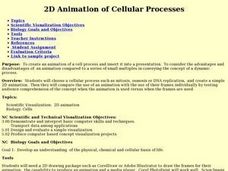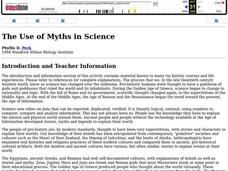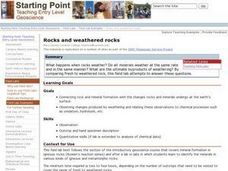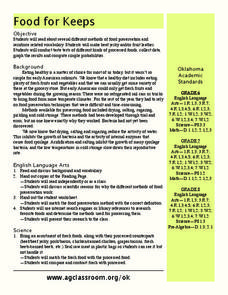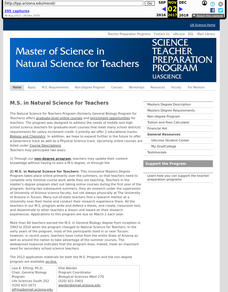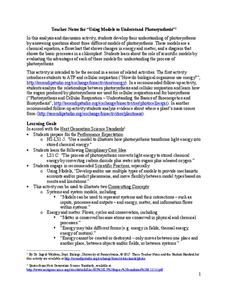Curated OER
2D Animation of Cellular Processes
Students create an animation of a cell process and insert it into a presentation. They choose a cellular process such as mitosis, osmosis or DNA replication, and create a simple 2D animation.
Curated OER
Centrifugal Force and Mandy Sue Day
Fourth graders explore the story Mandy Sue Day and investigate centrifugal force. They demonstrate the concept of centrifugal force, use analytical thinking and they conduct an experiment using centrifugal force. Students discuss the...
Curated OER
Penny Lab (#36, 10 points)
In this scientific method worksheet, students test how many drops of water can fit onto a penny before it overflows and answer short answer questions about the process.
Curated OER
Paper From Paper Experiment
In this paper from paper experiment, students follow the procedures to make recycled paper and answer questions about the process.
IB Psychology
Key Terms Traffic Lights
How much does your class know about psychology? What about empirical evidence? If they could use some time to learn the essentials of psychology, use a quick reference sheet to note what they know before the test, after the unit, and at...
Curated OER
Biology Project: Gone Fishing
Students write a scientific article using data and prediction skills. In this scientific writing lesson, students access data about fishing off the coast of New Jersey. They look at satellite data, fluorometry and CTD data over a 3 -4...
Curated OER
Growing A Coral Skeleton
Learners research the growth of coral. In this coral polyps lesson, students simulate the growth of coral by using available materials to grow crystals. Learners record observations in a scientific journal.
Curated OER
Gallery Walk Questions about Energy and Material Cycles
Students state the physical, chemical or biological processes associated with these environments: Pelagic ocean zone, California coat Cave, Indiana Barrier island beach, North Carolina Sand dune, Dunes National Park, Colorado Wetland and...
Curated OER
The Use of Myths in Science
Students examine folk tales to determine the basis for scientific myths. They demonstrate through the discussion of the folk tales that the perception of the world has changed as new information is gained. They write their own folk...
Curated OER
The Stroop Effect
Students explore the specific areas of the brain that process different types of information. They examine processing conflicts. Students participate in a hands-on minds-on activity using the Stroop Effect. They design psychological...
Curated OER
Rocks and weathered rocks
Students connect rock and mineral formation with the changes rocks and minerals undergo at the earth's surface. They observe changes produced by weathering and relating these observations to chemical processes such as oxidation,...
Curated OER
Food For Keeps
Students explore food. In this processed and fresh foods lesson, students discover how some foods are processed and how they differ from fresh food. The complete group activities and an individual reading assignment. This lesson includes...
Curated OER
Zoom Out
Students explore visual perception and how objects change as distance changes. In this distance and vision lesson, students practice their scientific inquiry skills. Students practice drawing objects from different points of view in...
Curated OER
Spiders: An Organism for Teaching Biology
In this unit, the students explore basic ecology concepts and scientific processes using spiders as model organisms. They capture spiders, observe and care for them, and use them to answer their own questions about spider behavior....
Curated OER
What Is A Plant?
Students explore plants. In this plant lesson, students examine organisms to determine which are plants. During this introductory lesson, students explore characteristics of living things.
Curated OER
Microscope Investigation
Students explore physical science by participating in a science examination. In this microscope tutorial lesson, students read the book The Naked Eye and discuss the purpose for using a microscope in the field of science. Students...
Curated OER
The Process of Art Criticism
Students interpret possible meanings of works of art by analyzing how specific works are created and how they relate to historical and cultural contexts
Curated OER
Chapter 1: The Science of Biology
Provide young biologists with everything they need to excel in the study of lymphatics, the nervous system, hormones, cellular division, and more! Pupils utilize the workbook, complete with end-of-chapter assessment worksheets, to gain...
Curated OER
Summer Science Recipes: Experiments on the Grill and in the Kitchen
Generate ideas about the most scientifically sound ways to prepare foods safely and efficiently during the summer season. Learners will use the GED Connection Science Workbook, so they can practice the skills needed to prepare for the...
Curated OER
Genetic Engineering
Students identify relationships between scientific concepts and their historical roots. They discuss and debate issues of ethics in science, specifically on the concept of genetic engineering and describe the processes of cloning and...
Serendip
Using Models to Understand Photosynthesis
Is your class in the dark about photosynthesis? Shed some sunlight on an important biological process with a thoughtful activity. After answering questions to help determine their level of knowledge, learners work with chemical equations...
Curated OER
Eggs'ceptional Experiments
Young scholars see evidence of chemical reaction and follow the scientific method to hypothesize, observe, and reach conclusions. They conduct a series of egg based experiments such as forming crystals and complete journal activities as...
Curated OER
Apply Technological Design and Scientific Habits of Mind
Students are introduced to the principles involved with technological design. In groups, they use the Internet to research an important historical innovation and how it changed the world. They discover the barriers that were involved in...
Curated OER
Organic and Inorganic Waste
Students conduct a scientific investigation about organic or inorganic waste. For this organic or inorganic waste lesson, students create a compost heap to determine the difference between inorganic and organic waste. Students record...
Other popular searches
- Scientific Process Skills
- The Scientific Process
- Scientific Process Observe
- Scientific Process Food
- Scientific Process Bridges
- Scientific Process Measure
- Scientific Process Lab
- Scientific Process Vitamin C
- Science Scientific Process


